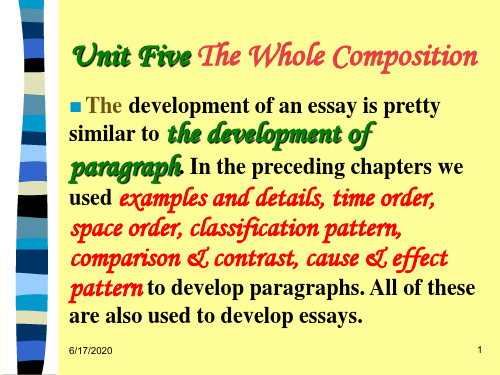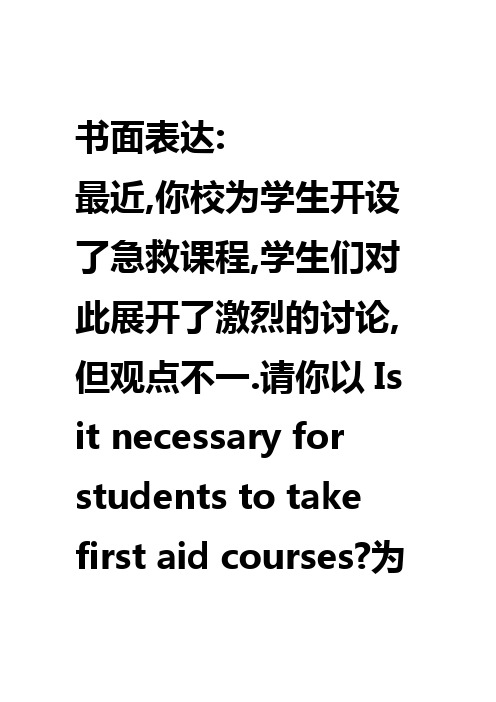UnitFiveComposition(1)
- 格式:doc
- 大小:640.50 KB
- 文档页数:5


英语口译基础UnitFive(最终定稿)第一篇:英语口译基础Unit FiveUnit Five一、口译技巧二、单句口译三、口译实践1、体育比赛赛前新闻发布会主题导入:体育局官员在国际马拉松比赛赛前新闻发布会上介绍赛事准备情况。
大家好!欢迎大家参加本次国际马拉松比赛的赛前新闻发布会。
首先我想向各位介绍一下这次比赛的几点特色,然后再回答媒体朋友的提问。
Thank you all for attending the press conference on the international marathon.First of all, I will brief you on the following features of this year’s competition, and then I would like to answer questions raised by friends from media.首先,这次马拉松赛事世界级的高水平赛事。
目前已经确定有17名海外马拉松高手参赛,他们分别来自西班牙、肯尼亚、坦桑尼亚、厄瓜多尔、巴西、埃塞俄比亚和朝鲜等7个国家。
First, the international marathon is a world class competition.So far, it has been confirmed that 17 foreign marathon runners have signed up for it.They come from seven countries including Spain, Kenya, Tanzania, Ecuador, Brazil, Ethiopia and North Korea.同时我们还邀请到曾参加全国马拉松锦标赛和奥运会马拉松选拔赛的国内运动员120人参赛。
这些国内外优秀选手的加入,必将使本次比赛的竞争更加激烈,赛事更加异彩纷呈、引人关注。



书面表达:最近,你校为学生开设了急救课程,学生们对此展开了激烈的讨论,但观点不一.请你以Is it necessary for students to take first aid courses?为Recently, my school began to carry out first aid courses, which led to a heated discussion among the students. Their opinions vary from person to person.80 percent of the students find it necessary for students to take first aid coursesbecause nobodycan foresee what will happen. They believed strongly that only if we take the courses can we save the lives when accidents happen.However still some students, about 20 percent, don't think so. They considered it to be unnecessary.In their opinion, it is convenient to see a doctor nowadays evenif there is an accident. What's more,they can't spare time to take first aid courses with such heavy study burden on them.As for me, I suggest that every one of us shouldtake this kind of courses seriously.There is no doubt that not only can we save ourselves but also help others out of danger by learning the knowledge of first aid. In a word, a good knowledge of first aid makes all the difference.。

英语第5单元下册1~3单元作文范文As we delve into the world of language, particularly English, we uncover the intricate web of communication that connects us all. The journey through the fifth unit of our studies brings to light various themes and ideas that resonate within our everyday experiences. This essay aims to encapsulate key insights and reflections from units one to three, offering a comprehensive look at the beauty and complexity of the English language.Language is fundamentally our mode of communication. It allows us to express ourselves, convey emotions, share knowledge, and connect with others. The first unit emphasizes this point by investigating how different forms of communication exist beyond just spoken or written words. We explore non-verbal cues such as body language, gestures, and facial expressions that complement verbal communication.Furthermore, we recognize that language is ever-evolving. New words are coined every day, while others fade into obscurity. This fluidity is part of what makes studying a language so fascinating. The ability to adapt language to reflect cultural changes—slang, idioms, and technological advancements—demonstrates how closely tied language is to our society.In learning English, we not only acquire a means to communicate; we gain access to a vast array of literature, films, music, and other cultural artifacts. Through these mediums, we can appreciate diverse perspectives and ideas, which enriches our understanding of the world around us.The second unit shifts focus from communication as a general concept to how individuals express their identities through language. English serves as a powerful tool for self-expression, enabling us to articulate who we are and what we believe in. As students of English, we are encouraged to exploreour unique voices—whether through writing essays, engaging in debates, or participating in dialogue.One significant aspect highlighted in this unit is the influence of personal experiences on language use. Our backgrounds shape the way we communicate; for instance, regional dialects can reflect where someone hails from or what social circles they move in. This diversity in expression showcases the richness of English as a global language while also inviting an appreciation for differences in culture.Moreover, expressing oneself eloquently requires practice and study. Through engaging with different texts—from poetry to prose—we learn how to harness the power of words effectively. We analyze how authors convey emotion through their choice of vocabulary and sentence structure, which inspires us to develop our own writing styles.Language learning can often present challenges that require resilience and determination. The third unit addresses these obstacles head-on, exploring common difficulties faced by learners of English. From pronunciation nuances to grammatical complexities, it recognizes that mastering a language is an ongoing journey.Fear of making mistakes can deter individuals from fully embracing language learning. However, this unit reassures us that mistakes are integral parts of the learning process. By viewing errors as opportunities for growth rather than setbacks, we become more confident communicators.Moreover, the unit emphasizes collaboration among learners as a powerful tool for improvement. Group activities can foster environments where students feel comfortable practicing their skills without fear of judgment. Encouraging open dialogue among peers creates a supportive community where everyone can thrive together.Throughout units one to three, it becomes evident that language is deeply intertwined with culture. Each language carries with it stories, traditions, and values that reflect its speakers’ ways of life. English is no exception; its origin stories trace back through centuries of history influenced by various cultures and peoples.Learning about idiomatic expressions or cultural references enriches our understanding of conversations in English-speaking contexts. For example, phrases like “break the ice” or “cost an arm and a leg” have origins that reveal much about historical social practices or economic conditions.Furthermore, immersing ourselves in English-language literature exposes us to different cultural narratives. Whether it’s Shakespearean plays exploring huma n nature or contemporary novels tackling modern issues like identity and belonging, these stories broaden our horizons and foster empathy towards others’ experiences.Engaging with literature also enhances our critical thinking skills as we learn to analyze themes and character motivations. The beauty of storytelling lies in its ability to transcend boundaries—allowing readers from varying backgrounds to find common ground.In conclusion, our exploration through the fifth unit highlights not just the mechanics of the English language but also its profound impact on communication, identity formation, overcoming barriers, and cultural appreciation. Each unit offers invaluable lessons that contribute to our growth as learners and communicators.As we continue our journey with English, let us embrace both the challenges and triumphs encountered along the way. Every word learned brings us closer to understanding diverse perspectives while reinforcing our unique voices within the broader tapestry of humanity.Ultimately, studying English enriches our lives in myriad ways—equipping us with tools for self-expression while fostering connections across distances. As we look ahead, may we carry forward our passion for learning about language: constantly evolving it like art on a canvas painted by voices from all walks of life.。
人教版九年级全册英语Unit1-Unit5作文与范文汇编Unit1(1)题目:英语是中学的一门重要课程。
但是,有的同学因学习方法不当而学习效果不佳;有的同学因畏惧困难而放弃了英语学习,针对这些现象,《学生英文报》展开了“怎样学好英语的讨论。
请你以"How to Learn English well?”为题,谈谈你对英语学习的看法和学好英语的一些建议。
要点:80-100;2.字迹工整,语言流畅,表达正确,逻辑清晰。
How to Learn EnglishEnglish is important and useful to us. How can we learn it well? There are three good ways to help you. First, I think you should listen to English tapes every day. It is also a good idea to watch English movies and sing English songs because this will help you to improve your pronunciation. Second, you could try to improve your English by having conversations with your friends in English. Don't be afraid of making mistakes. The more you speak, the fewer mistakes you'll make. This will help you to be confident. Third, you can keep a diary in English. If you do this, you'll make great progress.In a word, as long as we do more listening, speaking, reading and writing, we will learn English well.(2)题目:假如你的一位外国朋友暑假来中国旅游,你带他/她去颐和园、故宫长城等地。
Unit 5 Art world单元话题满分范文必背1.艺术陶冶情操, 涵养生命。
你喜欢的艺术形式是什么, 有过怎样的经历, 又有怎样的感受呢?请在下列图示中任选一种或自选一种其他艺术形式, 用英语写一篇短文。
注意:1. 词数90左右, 短文开头已给出, 不计入总词数。
2. 表达中请勿提及真实校名及姓名。
Art plays an important role in our life.___________________________________________________________________________________________ ___________________________________________________________________________________________ ___________________________________________________________________________________________ ___________________________________________________________________________________________ ___________________________________________________________________________________________ ___________________________________________________________________________________________【答案】One possible version:Art is an important part of our life. My favourite art is making kites.According to my grandparents, when I was young, I looked forward to flying. One year, when spring came, my grandfather made a kite for me. That made me quite excited. When I held a line to let my kite fly into the sky, I knew my dream of flying came true.As I’m growing older, like a kite, I will leave my parents. But I know the line is still in my parents’ hand. With them behind me, I can fly farther and farther.Art teaches us a lot. It makes our life rich and colourful.【解析】1.题干解读:题目要求从所给的图示中任选一种或或自选一种其他艺术形式,写一篇短文来介绍自己喜欢的艺术形式,并结合自己的经历谈谈自己的感受。